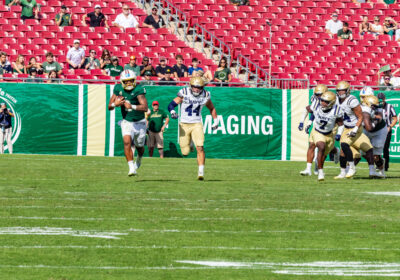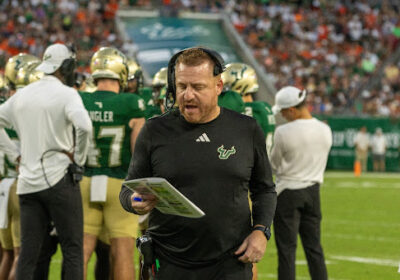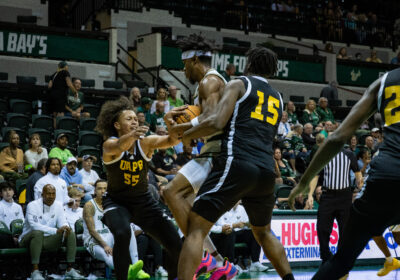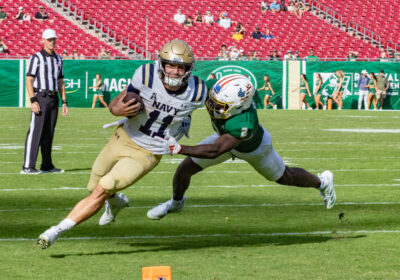An international family within USF women’s soccer

Evelyne Viens (middle) celebrates with Andrea Hauksdottir (10) and Katie Kitching (7) after scoring a goal. Viens is from Canada, Hauksdottir is from Iceland and Kitching is from England. ORACLE PHOTO/SAM NEWLON
When Evelyne Viens, USF’s forward, visited Tampa, she was worried about being homesick.
She’d potentially travel 1,632 miles from her hometown, L’ancienne-Lorette, Canada, to play soccer and go to school at USF. A key aspect that helped her make her decision was coach Denise Schilte-Brown.
“The first time I came to visit, [Schilte-Brown] said: ‘if you’re homesick, you can come over and eat dinner with us. We’ll always be there for you,’ which was a major factor,” said Viens.
Offering Viens a spot at her table could be chalked up to a simple recruiting technique, but Schilte-Brown, a native of Halifax, Nova Scotia, likely had that generosity ingrained in her personality.
She recalled watching a man from her hometown gift a stranger the shirt off his back because the stranger said they liked it.
Schilte-Brown said she was among the first wave of female soccer players in Canada to travel to the U.S. to play soccer.
“It wasn’t a common thing when I was coming out of Canada,” she said. “I happened to be very young when I had the goal that nobody else thought was even possible — or a good idea.”
Schilte-Brown competed in American soccer tournaments and received letters in the mail from American schools. After a few college visits, she received a full scholarship to the University of Maryland, Baltimore County.
“I was definitely a pioneer,” she said.
Unknowingly, Schilte-Brown helped set a precedent that follows her today. At the helm of No. 19 USF, she currently coaches nine international student-athletes — six of which are Canadian.
“When you grow up in a country, you understand the system better than everybody else,” Schilte-Brown said. “I would know where the best players are — even the ones that aren’t in the national pool. I would know where that next tier is that could compete for the national pool.”
One of the players who flew under the radar was freshman Mia Palango from Hamilton, Ontario. The rookie defender has only been off the pitch for 19 minutes all season.
“I think you only find a kid like [Palango] if you are native,” Schilte-Brown said. “She wasn’t even on her provincial team, she hasn’t been in the national pool and she’s been starting every game for us at center back.”
Viens was assigned a mentorship role to help the younger Palango feel more comfortable when she came to USF.
Palango recalled one moment that made her feel at home — Viens left a handwritten note in Palango’s locker.
“It said: ‘We love you, keep working hard, we’re so happy you’re here,’” Palango said. “That was very thoughtful, I’ll definitely do that for some of the younger players next year.”
Palango cited the drastic difference in climate as the toughest part of her transition from Canada. Viens, on the other hand, worried about some basic tasks American students might not think of — setting up international phone numbers and bank accounts.
Viens also spoke only one language when she arrived in Tampa — French. It wasn’t long before her teammate, Yasmin Hall, who is from Edmonton, Canada, stepped up. She served as a translator for Viens to help her pick up English phrases and communicate with her team.
Hall transferred to Kent State after last season, but it seems the Bulls have a steady stream of international students coming in each year.
The Bulls had nine international students on their roster last season and 13 the season before that. Conference opponents Memphis and UCF have 15 and nine international students on their respective rosters.
USF, however, is unique in that it has established a culture of international success, according to Schilte-Brown.
“I think you get a reputation,” she said. “The girls that have come through our program have felt like they’ve been treated right and felt growth in themselves as a person and a player.
“When you can build that reputation, then you can get more and vice versa. A lot of schools that are bringing in international students and haven’t dealt with them well — when that happens, the Canadians, or any foreign player, looks at that program and sees that as a higher risk.”
The Bulls don’t feature just Canadian players, however, the current roster has faces from Ghana, England, Iceland and Jamaica — including sophomore defender Chyanne Dennis, who could represent Jamaica in the 2019 FIFA Women’s World Cup if Jamaica is a top-three finisher in the 2018 CONCACAF Women’s Championship this year.
Dennis wouldn’t be the only Bull playing in the World Cup if her nation qualifies. There are USF alumni from England, Mexico, Costa Rica, Chile and New Zealand.
“There’s a lot of pride from where [the players] come from, but we’ve created a family culture,” Schilte-Brown said. “So when you get to watch your teammate on TV in a national event … we’re cheering for them. That’s exciting.”
The culture away from the pitch for the USF women’s soccer team seems similar to the culture on the pitch — do your part and help your teammates.
“I feel like at USF, you do something and you pass it,” Viens said. “When I was a freshman, the senior class helped me and I did the same with the sophomores and the freshmen.”






